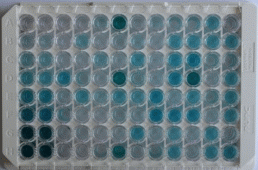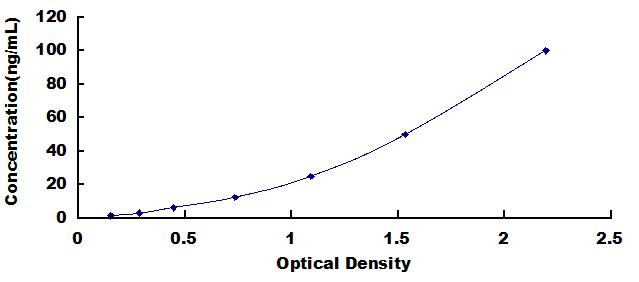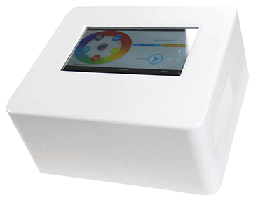Packages (Simulation)

Reagent Preparation

Image (I)
Image (II)
Certificate


ELISA Kit for Calreticulin (CALR)
CRT; RO; SSA; CC1qR; ERp60; HACBP; grp60; CRTC; CRP55; Calregulin; Sicca Syndrome Antigen A; Autoantigen Ro; Endoplasmic reticulum resident protein 60
- Product No.SEB486Mu
- Organism SpeciesMus musculus (Mouse) Same name, Different species.
- Sample Typeserum, plasma, tissue homogenates, cell lysates, cell culture supernates and other biological fluids
- Test MethodDouble-antibody Sandwich
- Assay Length3h
- Detection Range1.56-100ng/mL
- SensitivityThe minimum detectable dose of this kit is typically less than 0.59ng/mL.
- DownloadInstruction Manual
- UOM 48T96T 96T*5 96T*10 96T*100
- FOB
US$ 479
US$ 684
US$ 3078
US$ 5814
US$ 47880
For more details, please contact local distributors!
Specificity
This assay has high sensitivity and excellent specificity for detection of Calreticulin (CALR).
No significant cross-reactivity or interference between Calreticulin (CALR) and analogues was observed.
Recovery
Matrices listed below were spiked with certain level of recombinant Calreticulin (CALR) and the recovery rates were calculated by comparing the measured value to the expected amount of Calreticulin (CALR) in samples.
| Matrix | Recovery range (%) | Average(%) |
| serum(n=5) | 82-99 | 92 |
| EDTA plasma(n=5) | 84-92 | 89 |
| heparin plasma(n=5) | 78-97 | 88 |
Precision
Intra-assay Precision (Precision within an assay): 3 samples with low, middle and high level Calreticulin (CALR) were tested 20 times on one plate, respectively.
Inter-assay Precision (Precision between assays): 3 samples with low, middle and high level Calreticulin (CALR) were tested on 3 different plates, 8 replicates in each plate.
CV(%) = SD/meanX100
Intra-Assay: CV<10%
Inter-Assay: CV<12%
Linearity
The linearity of the kit was assayed by testing samples spiked with appropriate concentration of Calreticulin (CALR) and their serial dilutions. The results were demonstrated by the percentage of calculated concentration to the expected.
| Sample | 1:2 | 1:4 | 1:8 | 1:16 |
| serum(n=5) | 98-105% | 93-101% | 90-98% | 78-92% |
| EDTA plasma(n=5) | 81-103% | 87-104% | 78-98% | 91-102% |
| heparin plasma(n=5) | 79-99% | 79-93% | 92-101% | 79-104% |
Stability
The stability of kit is determined by the loss rate of activity. The loss rate of this kit is less than 5% within the expiration date under appropriate storage condition.
To minimize extra influence on the performance, operation procedures and lab conditions, especially room temperature, air humidity, incubator temperature should be strictly controlled. It is also strongly suggested that the whole assay is performed by the same operator from the beginning to the end.
Reagents and materials provided
| Reagents | Quantity | Reagents | Quantity |
| Pre-coated, ready to use 96-well strip plate | 1 | Plate sealer for 96 wells | 4 |
| Standard | 2 | Standard Diluent | 1×20mL |
| Detection Reagent A | 1×120µL | Assay Diluent A | 1×12mL |
| Detection Reagent B | 1×120µL | Assay Diluent B | 1×12mL |
| TMB Substrate | 1×9mL | Stop Solution | 1×6mL |
| Wash Buffer (30 × concentrate) | 1×20mL | Instruction manual | 1 |
Assay procedure summary
1. Prepare all reagents, samples and standards;
2. Add 100µL standard or sample to each well. Incubate 1 hours at 37°C;
3. Aspirate and add 100µL prepared Detection Reagent A. Incubate 1 hour at 37°C;
4. Aspirate and wash 3 times;
5. Add 100µL prepared Detection Reagent B. Incubate 30 minutes at 37°C;
6. Aspirate and wash 5 times;
7. Add 90µL Substrate Solution. Incubate 10-20 minutes at 37°C;
8. Add 50µL Stop Solution. Read at 450nm immediately.
GIVEAWAYS
INCREMENT SERVICES
-
 Single-component Reagents of Assay Kit
Single-component Reagents of Assay Kit
-
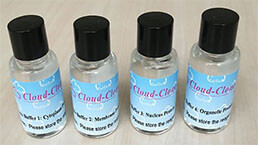 Lysis Buffer Specific for ELISA / CLIA
Lysis Buffer Specific for ELISA / CLIA
-
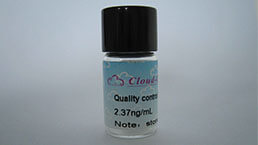 Quality Control of Kit
Quality Control of Kit
-
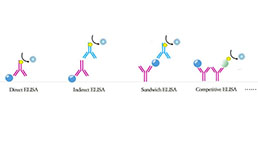 ELISA Kit Customized Service
ELISA Kit Customized Service
-
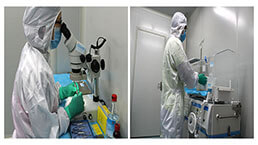 Disease Model Customized Service
Disease Model Customized Service
-
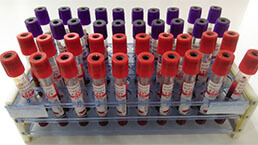 Serums Customized Service
Serums Customized Service
-
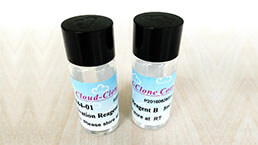 TGFB1 Activation Reagent
TGFB1 Activation Reagent
-
 Real Time PCR Experimental Service
Real Time PCR Experimental Service
-
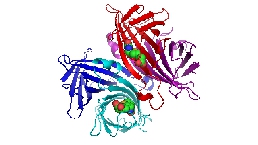 Streptavidin
Streptavidin
-
 Fast blue Protein Stain solution
Fast blue Protein Stain solution
-
 Single-component Reagents of FLIA Kit
Single-component Reagents of FLIA Kit
-
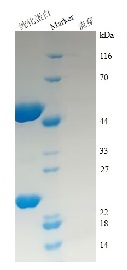 Streptavidin-Agarose Beads
Streptavidin-Agarose Beads
| Magazine | Citations |
| Journal of Investigative Dermatology | Oxidative Stress-Induced Calreticulin Expression and Translocation: New Insights into the Destruction of Melanocytes Pubmed: 23771121 |
| International Journal of Molecular Sciences | The Anticoagulant Effect of PGI2S and tPA in Transgenic Umbilical Vein Endothelial Cells Is Linked to Up-Regulation of PKA and PKC Mdpi: Source |
| The Journal of Maternal-Fetal & Neonatal Medicine | Amniotic fluid calreticulin in pregnancies complicated by the preterm prelabor rupture of membranes Pubmed:26953684 |
| journal of maternal-fetal & neonatal medicine | Cervical fluid calreticulin and cathepsin-G in pregnancies complicated by preterm prelabor rupture of membranes. pubmed:28152632 |
| Talanta | Investigation of the interaction between calreticulin and immunoglobulin G by capillary electrophoresis and computer modeling Doi: 10.1016/j.talanta.2018.11.098 |
| Sci Adv | Thermostable ionizable lipid-like nanoparticle (iLAND) for RNAi treatment of hyperlipidemia Pubmed:35171673 |
| Catalog No. | Related products for research use of Mus musculus (Mouse) Organism species | Applications (RESEARCH USE ONLY!) |
| RPB486Mu02 | Recombinant Calreticulin (CALR) | Positive Control; Immunogen; SDS-PAGE; WB. |
| RPB486Mu01 | Recombinant Calreticulin (CALR) | Positive Control; Immunogen; SDS-PAGE; WB. |
| PAB486Mu01 | Polyclonal Antibody to Calreticulin (CALR) | WB; IHC |
| PAB486Mu02 | Polyclonal Antibody to Calreticulin (CALR) | WB; IHC; ICC; IP. |
| SEB486Mu | ELISA Kit for Calreticulin (CALR) | Enzyme-linked immunosorbent assay for Antigen Detection. |
| LMB486Mu | Multiplex Assay Kit for Calreticulin (CALR) ,etc. by FLIA (Flow Luminescence Immunoassay) | FLIA Kit for Antigen Detection. |
| KSB486Mu01 | ELISA Kit DIY Materials for Calreticulin (CALR) | Main materials for "Do It (ELISA Kit) Yourself". |

